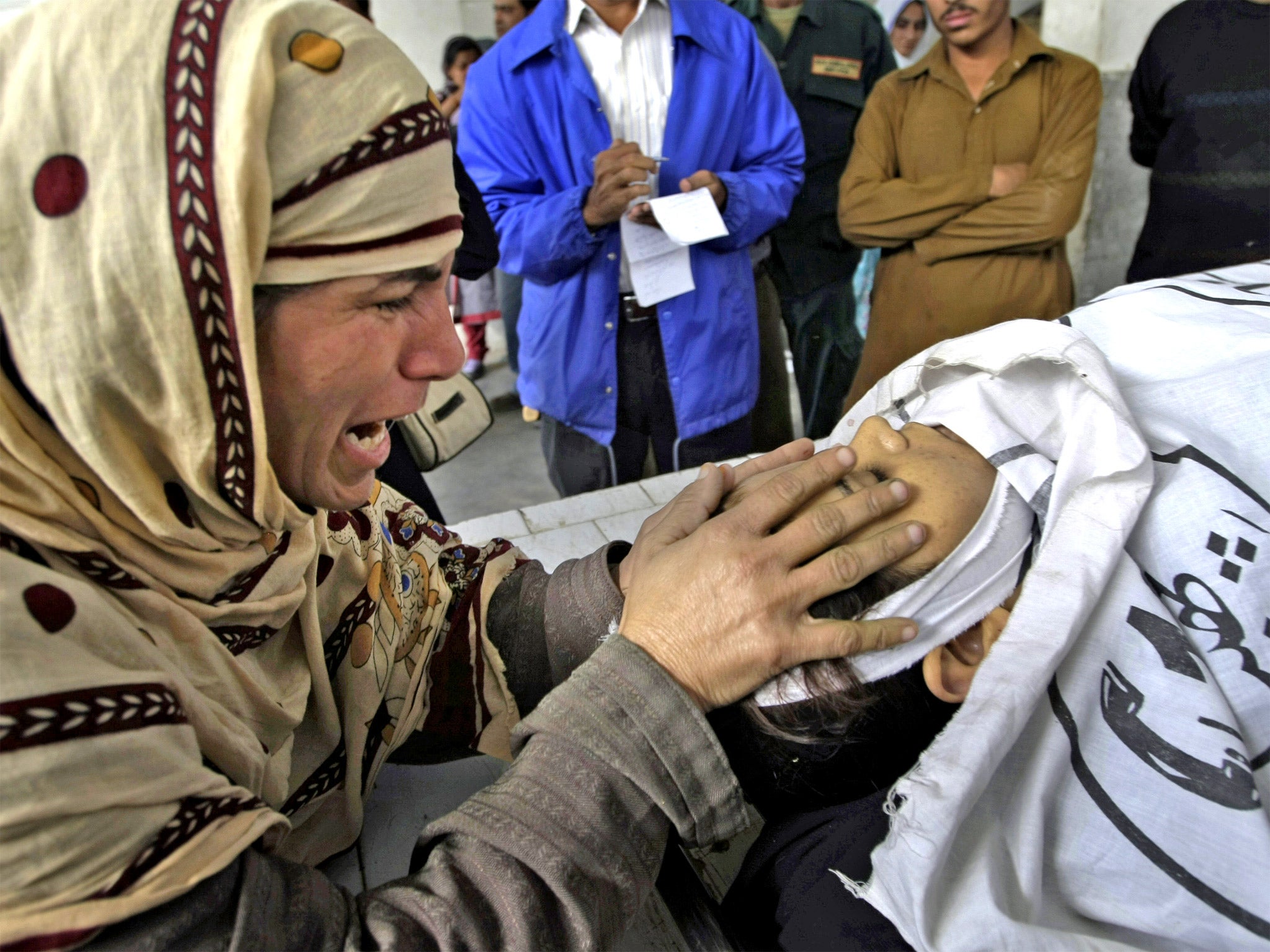Killed as they tried to save lives: Pakistan polio workers targeted
Vaccination programme suspended after five women are shot dead

Your support helps us to tell the story
From reproductive rights to climate change to Big Tech, The Independent is on the ground when the story is developing. Whether it's investigating the financials of Elon Musk's pro-Trump PAC or producing our latest documentary, 'The A Word', which shines a light on the American women fighting for reproductive rights, we know how important it is to parse out the facts from the messaging.
At such a critical moment in US history, we need reporters on the ground. Your donation allows us to keep sending journalists to speak to both sides of the story.
The Independent is trusted by Americans across the entire political spectrum. And unlike many other quality news outlets, we choose not to lock Americans out of our reporting and analysis with paywalls. We believe quality journalism should be available to everyone, paid for by those who can afford it.
Your support makes all the difference.Health experts have condemned a “devastating” assault by militants in which five female polio vaccinators were shot dead in co-ordinated attacks across two cities in Pakistan.
The murders highlight the challenge for health workers in what is one of the world's last bastions of the crippling disease. Four of the women were shot dead by men on motorbikes yesterday in three separate areas of Karachi, within the space of 20 minutes. The fifth woman was killed in Peshawar. A sixth vaccination worker, a man, was killed on Monday.
The women were working on a three-day vaccination scheme backed by the World Health Organisation in some of those areas where incidence of polio is the highest. The national drive, intended to give more than five million anti-polio drops, has been suspended in Karachi by the government.
No group has said it carried out the attacks but the Taliban is opposed to the health programme.
Polio often thrives in places where sanitation is poor. The ultimate aim of the project, which involves 90,000 health workers, is to provide drops to 35 million children. But the task of the government and the aid organisations has become increasingly difficult since the Taliban issued threats.
Sarah Crowe, Unicef's spokeswoman, said: "These attacks are a double tragedy. The work done to eradicate polio is pioneering. It has helped build up a foundation for stronger public health systems as health workers and polio vaccinators are often able to identify children who are missing out on routine immunisations. This comes at a time when Pakistan has made great strides against polio – last year 190 children contracted polio and this year it is 56. Every day the vaccination drive is on hold, more children lose out."
Sir Liam Donaldson, chairman of the independent monitoring board of the Global Polio Eradication Initiative, added: "The public health workers were doing heroic work to save children's lives in the final stage of the campaign to rid the world of a lethal and crippling disease. That they should lose their own lives in this appalling act of violence is devastating news for the global health community. In mourning their loss, we should honour their memories by showing their work will be carried on until every last child is safe from polio."
In many parts of Pakistan's north-west, the Taliban has banned such programmes, claiming they are a US-backed plan to sterilise Muslims. Antipathy to the vaccination drive has also increased since the CIA established a fake hepatitis drive in the city of Abbottabad to try to obtain information about Osama bin Laden.
Earlier this summer, more than 200,000 children in North and South Waziristan missed out on being vaccinated after the government failed to persuade militant leaders to lift their ban. "The polio workers have been targeted in these areas because there are elements of the Pashtun population – namely the Taliban – that are against the vaccination drive for various reasons," said Dr Guido Sabatinelli, head of the WHO's Pakistan's office.
"There is a misconception that the vaccine could be harmful to the children; there is a misconception that the polio workers are spies; and there is a misconception that the polio drives are somehow linked to military operations in the north and in the tribal areas."
Unlike India, which this year was declared polio-free, Pakistan is one of three nations still threatened by polio. The others are Nigeria and Afghanistan.The latest WHO figures suggest there have been 56 cases of polio confirmed in Pakistan this year with the results on about 300 other cases still outstanding. In 2011, almost 200 children were paralysed by the disease, the most in 15 years.
Yesterday's shootings, which were condemned by Pakistan's Prime Minister, Raja Pervez Ashraf, took place in parts of Karachi dominated by Pashtuns, who have a large presence in the port city of 18 million people.
Shahid Hayat, a senior police officer, blamed the killings on "militants who issued a fatwa against polio vaccination in the past". In addition to the women who were killed, two male workers were critically injured.
Mr Ashraf has ordered an inquiry into yesterday's killings and asked the authorities to do more to ensure the safety of those involved in polio eradication.
Polio: Number of cases in 2012
Nigeria 118
Pakistan 56
Afghanistan 34
Chad 5
Source: IMB
Join our commenting forum
Join thought-provoking conversations, follow other Independent readers and see their replies
Comments